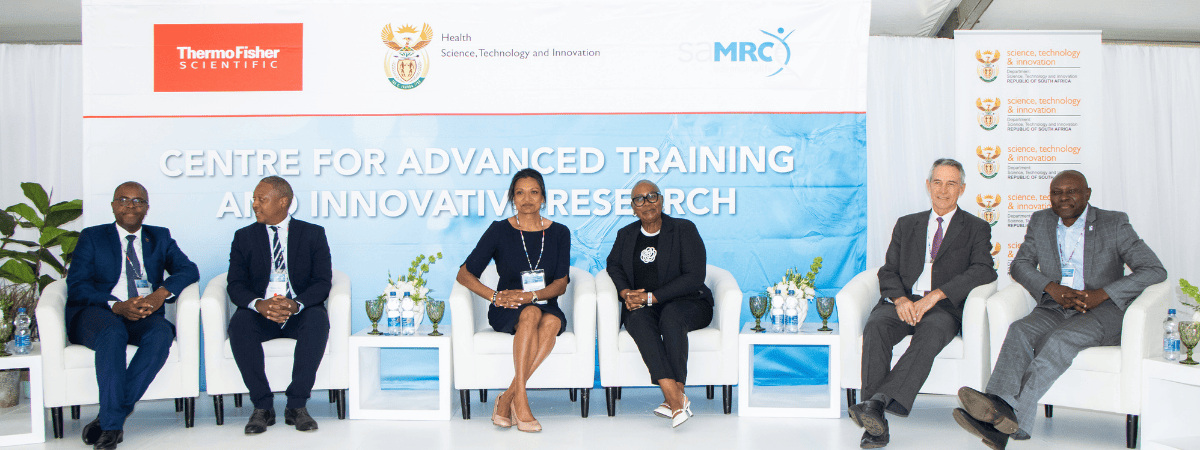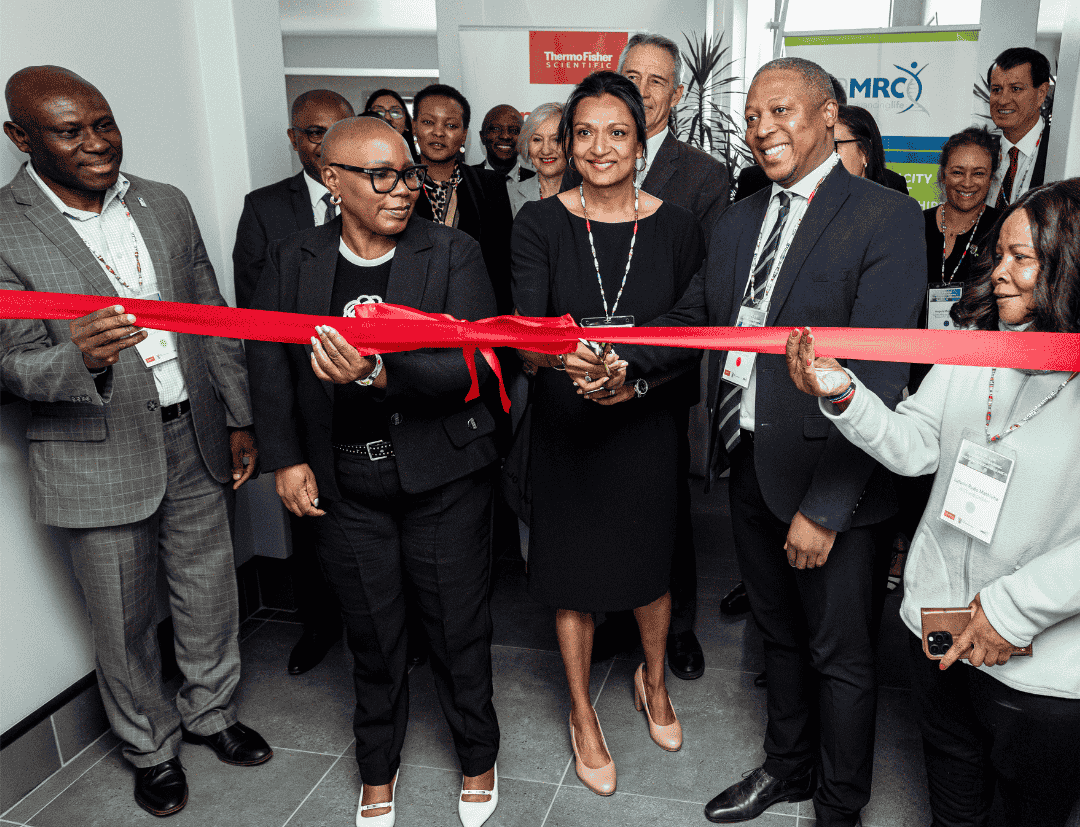By Robin Nalepa
Associate director, clinical research communications
 Panel from left to right: Dr Mlungisi Cele, DG at DSTI, Prof Ntobeko Ntusi, President and CEO at SAMRC, Urmi Richardson, Nomalungelo Gina, Deputy Minister at DSTI, Dr Nicholas Crisp, Deputy Director at Department of Health and Prof Pesscal Bessong from the University of Venda
Panel from left to right: Dr Mlungisi Cele, DG at DSTI, Prof Ntobeko Ntusi, President and CEO at SAMRC, Urmi Richardson, Nomalungelo Gina, Deputy Minister at DSTI, Dr Nicholas Crisp, Deputy Director at Department of Health and Prof Pesscal Bessong from the University of Venda
A new facility in Pretoria, South Africa, aims to enrich and train a new generation of scientists and laboratory professionals, while creating opportunities to retain emerging talent in the region. Thermo Fisher Scientific, in collaboration with the South African Medical Research Council (SAMRC) and the Department of Science, Innovation, and Technology (DSTI), launched the Centre for Advanced Training and Innovative Research (CATIR) on July 16, with a ceremony attended by members of the public-private partnership, the South African government and local universities.
“CATIR will offer students from local Pretoria universities training in advanced molecular science and laboratory management,” said Urmi Prasad Richardson, president of Europe, Middle East and Africa (EMEA) at Thermo Fisher Scientific, at the event. “Through the program, students will gain hands-on experience and exposure to our world-class technology and advanced sequencers and instruments.”
Building Local Capacity and Expertise
Successfully launching students into medical science careers requires a solid foundation in academic concepts, practical skill development and comprehensive training. However, access to resources and advanced training often steers their path. In many developing countries, students often migrate to other regions to complete their studies and remain there. This loss of skilled professionals negatively impacts local communities, economies and healthcare systems.
The collaboration behind CATIR recognizes the importance of keeping emerging African talent and scientists in the region, rather than having them leave to seek further education and skill-building opportunities.
 Ribbon Cutting from left to right: Prof Pesscal Bessong from the University of Venda, Nomalungelo Gina, Deputy Minister at DSTI, Urmi Prasad Richardson, president of Europe, Middle East and Africa (EMEA) at Thermo Fisher Scientific, Prof Ntusi, CEO and President at SAMRC (behind them is Dr Mlungisi Cele, DG at DSTI, Futhi, Prof Glenda Gray (former SAMRC President and CEO, now Professor at University of Witwatersrand), Dr Nicholas Crisp, Deputy Director at Department of Health and Marcin. Last row is Pritika Ramharack, Senior Scientist from SAMRC and Dr Mongezi Mdhluli, Chief Research Operations Officer at SAMRC.
Ribbon Cutting from left to right: Prof Pesscal Bessong from the University of Venda, Nomalungelo Gina, Deputy Minister at DSTI, Urmi Prasad Richardson, president of Europe, Middle East and Africa (EMEA) at Thermo Fisher Scientific, Prof Ntusi, CEO and President at SAMRC (behind them is Dr Mlungisi Cele, DG at DSTI, Futhi, Prof Glenda Gray (former SAMRC President and CEO, now Professor at University of Witwatersrand), Dr Nicholas Crisp, Deputy Director at Department of Health and Marcin. Last row is Pritika Ramharack, Senior Scientist from SAMRC and Dr Mongezi Mdhluli, Chief Research Operations Officer at SAMRC.
“I believe that this training initiative will be able to assist universities with developing their post-graduate students by building the next generation of scientists and by ensuring that they have a footprint as well in Africa,” said Pritika Ramharack, Ph.D., senior scientist, SAMRC.
The new lab and equipment supported by Thermo Fisher as part of the collaboration will also be open to innovators to develop new tests and conduct research focused on diseases that affect South Africa. It will help local researchers better understand, tackle and address health challenges specific to the region’s needs, Richardson said.
This is the only initiative of its kind currently in Africa for Thermo Fisher. Yet the company has a well-established history in South Africa, with a regional presence of more than 30 years that includes five operational sites and about 500 colleagues across the country.
“As a local employer and member of the community in South Africa, we are committed to making a meaningful contribution to healthcare access and the field of science, in the region and beyond,” said Kouri. “South Africa is a key market for Thermo Fisher, and we are investing our time, resources and knowledge in this facility to help build local capacity and expertise.”

